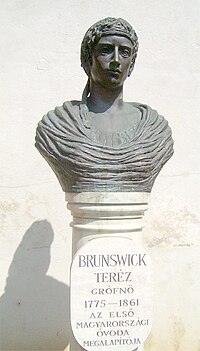

Countess Therese (von) Brunsvik (Hungarian: Teréz Brunszvik; July 27, 1775 in Pozsony, Kingdom of Hungary – September 23, 1861 in Pest, Kingdom of Hungary), sometimes referred to in English as Therese, Countess von Brunsvik or Brunswick, was a member of the Hungarian nobility, pedagogue and a follower of the Swiss Pestalozzi.
Early life
She was born as the eldest child and eldest daughter of Hungarian Count, Anton Brunszvik de Korompa (1746-1793) and his wife, Baroness Anna Barbara Wanckel von Seeberg (1752-1830). Her siblings were Count Franz (1779-1854), Countess Maria Josefa (1779-1821), Countess Josephine, and Countess Charlotte (1780-1843).
Biography
She was the founder of nursery schools in Hungary on July 1, 1828, after Robert Owen's example set in New Lanark, Scotland in 1816. Soon the pre-school institution became famous all over Hungary and in 1837, Friedrich Fröbel founded the first "kindergarten" in Germany.
One of Ludwig van Beethoven's students, Therese was the dedicatee for his Piano Sonata No. 24 (in F♯ major, Opus 78), and some writers speculated that she—not her sister Josephine who is generally accepted as the addressee—may have been the intended recipient of Beethoven's letter to the "Immortal Beloved". Her memoirs were first published by La Mara, who subscribed to this theory. and her diaries and notes (up to 1813) by Marianne Czeke, both claiming to reveal much about the relations between Beethoven and the Brunsvik family, in particular her sister Josephine.
References
- Public Preschool Education In Hungary: A Historical Survey, 1980
- Vag, Otto (March 1975). "The Influence of the English Infant School in Hungary". International Journal of Early Childhood. 7 (1). Springer: 132–136. doi:10.1007/bf03175934. S2CID 145709106.
- La Mara (1909) : Beethovens Unsterbliche Geliebte. Das Geheimnis der Gräfin Brunsvik und ihre Memoiren. Leipzig: Breitkopf & Härtel.
- Marianne Czeke (1938): Brunszvik Teréz grófno naplói és feljegyzései. Vol. 1. Budapest.
External links
- (in Hungarian) http://www.mek.iif.hu/porta/szint/egyeb/lexikon/eletrajz/html/ABC00523/02357.htm
- (in German) http://www.aeiou.at/aeiou.encyclop.b/b830508.htm